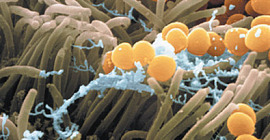A study of pregnant women in Norway found that those who were infected with the 2009 H1N1 influenza virus had an increased risk of miscarriages and stillbirths. But those vaccinated against the virus had no increased risk of pregnancy loss.
Influenza viruses have 2 surface proteins—hemagglutinin (H) and neuraminidase (N)—that allow them to enter and spread from cell to cell. btle variations in these proteins affect how easily the viruses infect people and whether the immune system can recognize them.
In 2009, a novel H1N1 virus emerged to cause a worldwide pandemic. Public health officials in Norway urged pregnant women to be vaccinated. However, media reports of pregnancy loss after flu shots kept some expectant mothers from getting the vaccine.
A research team led by former NIH researcher Dr. Siri Haberg, now at the Norwegian Institute of Public Health, in collaboration with Dr. Allen Wilcox of NIH's National Institute of Environmental Health Sciences (NIEHS), set out to determine if the influenza vaccination posed a risk to pregnancy. The investigators took advantage of Norway’s extensive registries and medical records system. The team examined data from over 117,000 pregnancies, including obstetrical visits, birth records and vaccination registries.
The scientists found that 54% of pregnant women in their second or third trimester were vaccinated during the pandemic. Vaccination substantially reduced the risk of an influenza diagnosis—by about 70%.
Get The Latest By Email
The results showed that influenza infection almost doubled the risk of fetal loss. Influenza vaccination, however, didn’t increase the risk of fetal loss.
Most important is that vaccinations protect pregnant women against influenza illness, which could be harmful for both the mother and the baby,” Wilcox says. If pregnant women are worried about their fetus, then getting a flu shot is a good thing to do.
Pregnant women should find it reassuring that we found no harmful effects on the fetus associated with H1N1 vaccination,” Haberg adds. Article Source: NIH Research Matters










